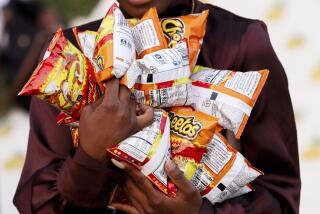2 More School Districts Take Apples Off Menu
Two more San Diego County school districts have refused to serve apples to students because of a chemical scare, but one elementary school district has put the fruit back on the menu after receiving assurances from the U. S. Department of Agriculture that the apples are not contaminated, authorities said Wednesday.
More than 17,000 students in the Alpine Union Elementary School District and the Oceanside Unified School District will have to go without apples, apple sauce and apple juice as administrators await government test results on whether the apples are contaminated with daminozide, a chemical used to control ripening.
But 16,000 students in the Cajon Valley Union Elementary School District will find apples on the lunch menu March 22 and 28. San Diego Unified school district--the second-largest in the state, with 117,000 students--is also continuing to serve apples.
Canned Products on Hold
Linda Patzold, Cajon Valley director of child nutrition, said she found out Wednesday from representatives of the Department of Agriculture that the apples there hadn’t been sprayed. Patzold said she will await further test results from the government, however, before serving canned apple slices, apple juice and apple sauce.
In Alpine, Charlotte Becker, director of food services, said: “We’re holding stock. With all the publicity, I just thought it was better to wait.”
Bonsall Union Elementary, Borrego Springs Unified, Encinitas Union Elementary, Fallbrook Union Elementary, Lemon Grove Elementary, South Bay Union Elementary, Sweetwater Union High and Valley Center Union Elementary school districts have stopped serving apples after a recent report by the nonprofit, Washington-based Natural Resources Defense Council that said daminozide can cause cancer.
Oceanside Unified district Supt. Steven Speach and the board of education decided Tuesday night to pull apples from school lunch menus until more information can be obtained, according to Tom Mackin of the district’s food service department.
Actions Called Premature
Officials have said the report has been misinterpreted and only 5% of the nation’s apple crop is treated with Alar, a brand name for the chemical.
“There are many chemicals out there that cause cancer. The toxicity of a chemical is based on exposure as well as its potency,” said Evan Siegal, supervising toxicologist of state Department of Health Services’ food and drug branch.
Siegal added that there is no proof that Alar causes cancer in humans. “We do not feel that the theoretical risk is high enough to justify even the removal of apples or apple products from the market or from school lunch programs.”
Kenneth Kizer, director of the state Department of Health Services, told reporters in Los Angeles on Tuesday that school-district actions to remove the fruit have been premature.
“While we are still reviewing the NRDC report for its technical validity, it’s important to understand that the theoretical risks associated with consuming trace pesticide residues on fruits and vegetables pale in comparison to the risks of not eating enough fruits and vegetables,” Kizer said.
More to Read
Sign up for Essential California
The most important California stories and recommendations in your inbox every morning.
You may occasionally receive promotional content from the Los Angeles Times.










